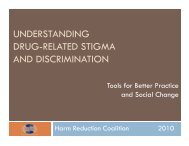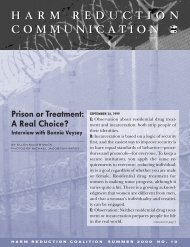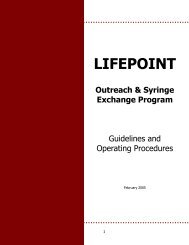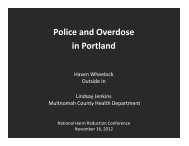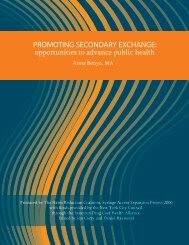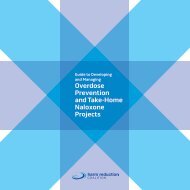9th - Harm Reduction Coalition
9th - Harm Reduction Coalition
9th - Harm Reduction Coalition
Create successful ePaper yourself
Turn your PDF publications into a flip-book with our unique Google optimized e-Paper software.
<strong>9th</strong><br />
National <strong>Harm</strong> <strong>Reduction</strong> Conference<br />
FROM PUBLIC HEALTH TO SOCIAL JUSTICE<br />
ness through methods that can reach many people, especially young people to expand their perceptions of harm reduction<br />
and what it means. This presentation proposes to explain how to offer tips on how to reach thousands of new readers through<br />
blogging, newsletters, interviews with harm reduction advocates and social media. The presentation will also explain how<br />
to build relationships with local media reporters, TV crews and radio hosts to gain their buy-in on harm reduction issues.<br />
Tessie Castillo serves as Coordinator for the North Carolina <strong>Harm</strong> <strong>Reduction</strong> <strong>Coalition</strong>. Tessie runs NCHRC’s outreach (incarcerated,<br />
drug user, sex worker and migrant laborer), education and advocacy programs and is NCHRC lead reporter for NCHRC media<br />
pieces. Prior to joining NCHRC, Tessie was an outreach worker for farm workers, a case manager for refugees settling, and a<br />
Spanish interpreter for survivors of human trafficking.<br />
Cavalieri, Walter<br />
Dodd, Zoe<br />
walter.cavalieri@rogers.com / ZDodd@srchc.com<br />
Prison Health Now: mobilizing for needle and syringe programs in Canada’s prison<br />
Almost 20 years after an expert committee acknowledged the need for prison-based needle and syringe programs (PNSPs)<br />
and despite mounting evidence in support of such programs and numerous requests from community organizations, PNSPs<br />
do not exist in Canada. This is in spite of rates of HIV and hepatitis C virus (HCV) that are at least 10 and 30 times higher<br />
in prison than in the population as a whole. Not only is this a public health concern, but a violation of prisoners’ constitutional<br />
rights. Repeatedly, the Canadian government has denounced PNSPs and clung to a “zero tolerance policy” on drugs<br />
in prison. However, significant investments in drug interdiction initiatives have yielded little success and rates of drug use<br />
remain steady behind bars. New legislation will also swell Canada’s already overcrowded prisons with people serving sentences<br />
for drug-related offences. Having advocated for PNSPs, with little success, before parliamentary committees, with<br />
public health and correctional officials, and through public education and media campaigns, a constitutional challenge was<br />
initiated by a former prisoner and four HIV organizations. The case will principally rest on the Canadian Charter of Rights<br />
and Freedoms, which protects prisoners’ rights to life, liberty and security of the person and to equal treatment before and<br />
under the law, and equal protection and benefit of the law without discrimination. The various forms of advocacy undertaken<br />
before the launch of the constitutional challenge were instrumental in building public support for PNSPs and helped to identify<br />
an applicant who was infected with HCV while incarcerated. A first volume of materials in support of the challenge was<br />
filed in September 2012, complemented by a website and video campaign. The applicants seek an order directing Canada’s<br />
correctional service to ensure the implementation of PNSPs, in accordance with professionally accepted standards.<br />
After a long, restless and successful career in theatre in New York and Canada - as a stage manager, acting teacher and publicist<br />
- Walter settled down to practice social work in Toronto. Initially he worked with youth on the downtown hustlers’ stroll, and later<br />
with inner-city adults, developing and delivering street-based harm reduction and peer training programs, researching the lives<br />
and practices of street-involved drug users, and honing his skills as a gadfly. He also worked part time, for ten years, as a personal<br />
therapist at Ryerson University’s counseling centre. Walter is a co-founder of HIV Edmonton, the Canadian <strong>Harm</strong> <strong>Reduction</strong><br />
Network and the Canadian Drug Policy Consortium.<br />
Centrone, Wayne, Center for Social Innovation, Boston, MA<br />
wcentrone@center4si.com<br />
Shared Decision Making - A New Recovery Support.<br />
The Substance Abuse Mental Health Services Administration through the Bringing Recovery Supports to Scale Technical<br />
Assistance Center Strategy contract is developing a Shared Decision Making (SDM) tool that will focus on the question of<br />
whether someone should seek Medication Assisted Treatment (MAT) for the experience of an opiate addiction. The SDM tool<br />
will help service users to consider the implications of their decisions about MAT. Through the use of video testimonials and<br />
16



